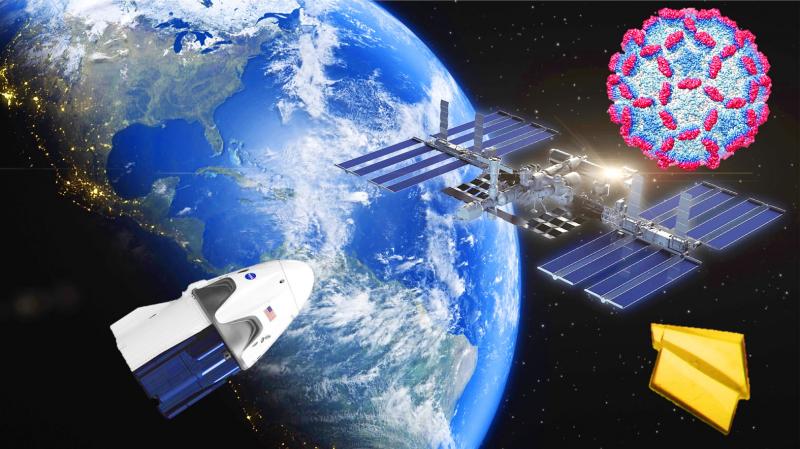A batch of virus-like particles cultivated by the National Synchrontron Radiation Research Center is to be sent to the International Space Station for crystallization experiments next month, in collaboration with Japanese company Space BD, the center announced yesterday.
Space BD in May said that it had been appointed as the sole private partner by the Japan Aerospace Exploration Agency (JAXA) for its high-quality protein crystal growth experiment service, HelioX Cosmos founder and CEO Bill Chang (張懷謙) said.
A parcel of the center’s particles has been sent to Japan for a US rocket launch scheduled next month, Chang said, adding that he could not reveal the precise time and rocket supplier for the mission.

Photo courtesy of the National Synchrotron Radiation Research Center
The particles are to stay in the space station’s lab for nearly a month, he said.
The launch is primarily a supply mission for the space station, the center said.
The particles are expected to crystallize while in space, and would be kept at minus-196°C after being returned to Earth, it said.
After the particles return to the center, researchers plan to utilize high-intensity X-ray and protein crystallography technology at the Taiwan Photon Source to observe changes in the particles, it said.
The particles originated from viruses that can cause diseases in humans or animals, and have been reduced to being “virus-like” after removal of their pathogenic genes, said center deputy director Chen Chun-jung (陳俊榮), who leads a team on molecular biology research.
While conducting postdoctoral research at the University of Georgia from 1999 to 2000, Chen engaged in a similar project in which particles were sent to space through a NASA-supported project, he said.
“We expect the quality of the particles’ crystallization to elevate significantly in a gravity-free environment, in comparison with that in general laboratories on Earth,” Chen said.
With better crystallization, researchers can analyze the viruses’ atomic structures with better depth and improve understanding about their pathogenic mechanisms, he said.
Although Chen did not state which types of viruses are being sent to the space station, the center’s news release referred to viruses that cause COVID-19, swine fever, avian influenza, and sealife diseases as examples that can claim lives and cause economic damage.
Improving our understanding about the viruses would help the development of new treatments, the center said, hoping to make breakthroughs in precision medicine and pandemic-prevention technology.
The center, headquartered at the Hsinchu science park, is affiliated with the Ministry of Science and Technology. The project has been coordinated by HelioX Cosmos, a Taiwanese start-up that is the official representative for the Japanese company.

Beijing could eventually see a full amphibious invasion of Taiwan as the only "prudent" way to bring about unification, the US Department of Defense said in a newly released annual report to Congress. The Pentagon's "Annual Report to Congress: Military and Security Developments Involving the People's Republic of China 2025," was in many ways similar to last year’s report but reorganized the analysis of the options China has to take over Taiwan. Generally, according to the report, Chinese leaders view the People's Liberation Army's (PLA) capabilities for a Taiwan campaign as improving, but they remain uncertain about its readiness to successfully seize

HORROR STORIES: One victim recounted not realizing they had been stabbed and seeing people bleeding, while another recalled breaking down in tears after fleeing A man on Friday died after he tried to fight the knife-wielding suspect who went on a stabbing spree near two of Taipei’s busiest metro stations, Taipei Mayor Chiang Wan-an (蔣萬安) said. The 57-year-old man, identified by his family name, Yu (余), encountered the suspect at Exit M7 of Taipei Main Station and immediately tried to stop him, but was fatally wounded and later died, Chiang said, calling the incident “heartbreaking.” Yu’s family would receive at least NT$5 million (US$158,584) in compensation through the Taipei Rapid Transit Corp’s (TRTC) insurance coverage, he said after convening an emergency security response meeting yesterday morning. National

Taiwan has overtaken South Korea this year in per capita income for the first time in 23 years, IMF data showed. Per capita income is a nation’s GDP divided by the total population, used to compare average wealth levels across countries. Taiwan also beat Japan this year on per capita income, after surpassing it for the first time last year, US magazine Newsweek reported yesterday. Across Asia, Taiwan ranked fourth for per capita income at US$37,827 this year due to sustained economic growth, the report said. In the top three spots were Singapore, Macau and Hong Kong, it said. South

Taiwan is getting a day off on Christmas for the first time in 25 years. The change comes after opposition parties passed a law earlier this year to add or restore five public holidays, including Constitution Day, which falls on today, Dec. 25. The day marks the 1947 adoption of the constitution of the Republic of China, as the government in Taipei is formally known. Back then the Chinese Nationalist Party (KMT) governed China from Nanjing. When the KMT, now an opposition party in Taiwan, passed the legislation on holidays, it said that they would help “commemorate the history of national development.” That